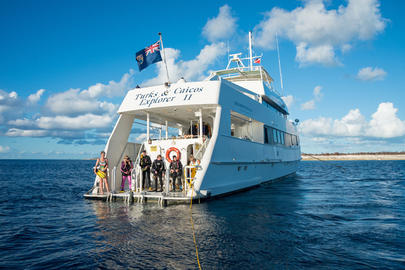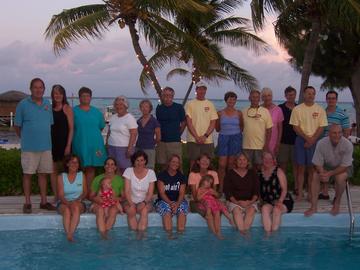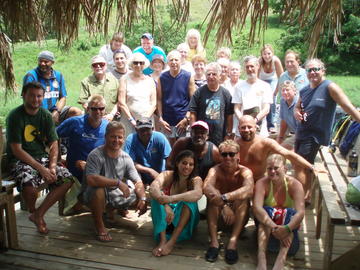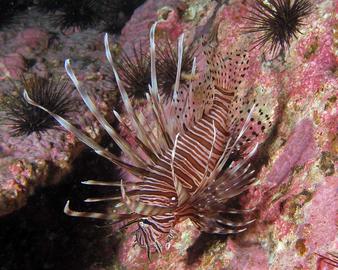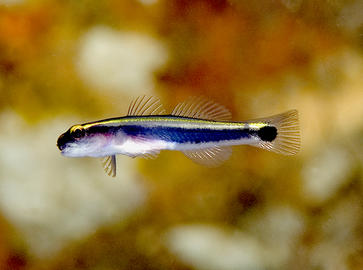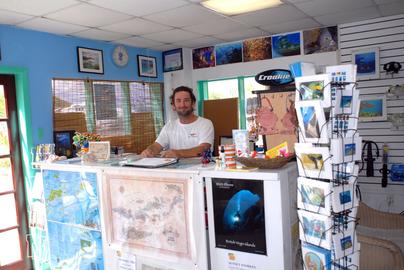This special Lionfish Research Trip is part of REEF’s ongoing effort to monitor the establishment and consequences of invasive lionfish on native fish populations and reef ecosystems. The trip includes a unique research itinerary aboard the Turks and Caicos Explorer II to visit remote areas of the Bahamas including Mayaguana, Plana Cays, Crooked Island, Salina Point, and Castle Island. Trip participants will also have the chance to be trained in lionfish collection, handling and dissection of specimens to document prey.
As Audrey reported in the previous article, REEF Field Surveys are more than just your average dive vacation. Not only are you joined by like-minded divers and led by dynamic experts in marine life, but the trips often include opportunities to learn more about a local culture and even participate in conservation activities or research. We already have several great destinations lined up for 2009 and are finalizing several more trips for the calendar.
REEF recently completed a Field Survey trip to Roatan, Honduras, led by REEF co-founder, Paul Humann. Over six days, the group completed 17 survey dives including one night dive. Both novice and highly experienced REEF surveyors enjoyed the near perfect weather and dive conditions. Shortfin pipehorses, wrasse blennies, linesnout gobies, peppermint basslets, orangesided gobies, dash gobies, and blue dartfish are a sample of the cryptic fishes that were observed. Spotted Eagle Rays and Southern Stingrays graced us with their presence on a number of dives.
South Water Caye Marine Reserve, in southern Belize, is a unique mangrove/coral reef habitat and home to several endemic species including the Social Wrasse and the Maya Hamlet. The goal of this trip is to study the effects of stressors such as invasive lionfish and habitat loss on this remote area of the Mesoamerican barrier reef system, with a special focus on how these impacts are affecting species that are not found anywhere else in the Caribbean. Participants will work with local partners to conduct fish surveys as well as lionfish research and removals.
The authors of this study (including REEF staff Lad Akins) examined the recent case of Indo-Pacific lionfish invading Northern Gulf of Mexico coastal waters. The authors compared traditional reef fish monitoring efforts to less traditional data including the observations of divers through REEF's Volunteer Fish Survey Project and spearfishers. They found that citizen observations documented lionfish 1-2 years earlier and more frequently than the more traditional monitoring efforts.
A recent publication in the scientific journal, Conservation Letters, examined the invasion of lionfish in to the western Atlantic and Gulf of Mexico waters. The authors compared traditional reef fish monitoring efforts to less traditional data including the observations of divers through REEF's Volunteer Fish Survey Project and spearfishers. They found that citizen observations documented lionfish 1-2 years earlier and more frequently than the more traditional monitoring efforts.
REEF Staff Dr. Christy Pattengill-Semmens (Director of Science) and Lad Akins (Director of Special Projects), joined over 300 scientists, resource managers, and fishers at the Gulf and Caribbean Fisheries Institute (GCFI) meeting last week in Corpus Christi, Texas. All three of REEF's major programs were represented.
In January, 2008 the National Aquarium Institute organized and conducted a Bahamian conservation expedition on the Aqua Cat live-aboard dive vessel. Our mission was to conduct REEF surveys and work on the invasive lionfish project. On board this trip were Lad Akins (REEF Special Projects Director), Ned and Anna DeLoach, Chris Flook (Bermuda Aquarium), National Aquarium staff, and aquarium and REEF volunteers. In addition to meeting the lionfish research goals of the cruise, we were treated to not one but two exciting and rare finds - the Exuma goby and the lemon goby.
REEF is proud to partner with over 130 dive shops, dive clubs, individuals, and other organizations as REEF Field Stations. Our featured Field Station this month, Paradise Watersports, is based at Peter Island Resort and Spa in the British Virgin Islands. Their team is led by Randy Keil, an active REEF surveyor and member of the Advanced Assessment Team. Randy was first introduced to REEF over 10 years ago by Lad Akins.
A tropical fish that calls the West Pacific Ocean home has been documented outside of its native range for the first time, making it Florida’s newest non-native marine fish species. A REEF member spotted a popular aquarium fish, the Onespot Rabbitfish, while scuba diving offshore of Dania Beach, Florida. Within 24 hours of receiving the sighting report, a coordinated effort by Reef Environmental Education Foundation (REEF) and the U.S. Geological Survey (USGS) led to the live-capture of the fish.

